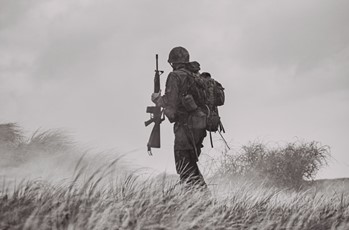David Coronel of Tampa Bay is a former combat veteran and a volunteer with Alcoholics Anonymous. In the article below, David Moss Coronel discusses why combat veterans are at greater risk of alcoholism, what’s being done to help our veterans, and what treatments are available to our service members.
In the decades following the Vietnam War, military service members’ psychological needs have become more widely acknowledged but, to date, the statistically high rate of alcohol abuse within the community has largely gone unaddressed—particularly as it relates to combat experience and post-traumatic stress disorder (PTSD). Although combat experience does not necessarily cause alcoholism, there is a strong correlation between the two, predisposing combat veterans to substance abuse says David Coronel of Tampa Bay.
Even among non-combat service members, there is an increased risk of alcohol abuse and dependency. This is in stark contrast to a lower-than-average risk for other substance abuses, which brings the question – why? In this article, David Moss Coronel of Tampa Bay explores the link between combat, trauma, and substance abuse, as well as a discussion on how psychological services have struggled to handle this complex issue in the past.
Alcoholism as a Coping Mechanism for Stress
It’s no secret that military service is a stressful experience says David Coronel of Tampa Bay. From the high-pressure environment of basic training to the daily grind of active duty, service members are constantly put under a microscope of expectations and responsibilities. For many, alcohol becomes a way to cope with this stress rather than other substances, due to strict no-tolerance policies for narcotics in the military.
This is further compounded by a majority-male population between the ages of 18 and 27. It’s well documented that alcohol consumption acts as a way for new recruits to connect and bond with their units, creating a culture based on binge drinking and “blowing off steam”. Yet, as alcohol becomes a crutch for high-pressure situations, young soldiers fail to learn healthy coping mechanisms explains David Coronel of Tampa Bay.
When faced with the extreme conditions and horrors of war, it’s often easier for young soldiers to embrace alcohol rather than express or explore their psychological needs. By the time they leave the service and transition into post-military life, roughly 1 in 15 veterans will deal with alcohol abuse and those odds go up to
1 in 5 for combat veterans.

 The Role of Trauma in Substance Abuse
The Role of Trauma in Substance Abuse
According to the DSM-5—the leading psychological diagnostic manual—trauma can be defined as “exposure to actual or threatened death, serious injury or sexual violence in one or more ways”. In fact, research suggests that as many as
10% of veterans returning from Iraq and Afghanistan suffer from the disorder, with many more likely undiagnosed reports David Moss Coronel of Tampa Bay.
As PTSD rates have increased, so too has the rate of alcohol abuse. It’s estimated that nearly half of all veterans with PTSD also suffer from alcoholism says David Coronel of Tampa Bay. This is likely due to the fact that alcohol acts as a form of self-medication for the stress and anxiety of the disorder. In a survey of Vietnam veterans diagnosed with PTSD, nearly 70% reported using alcohol to cope with symptoms.
While alcohol may offer temporary relief, it quickly leads to a dangerous cycle of abuse explains David Coronel of Tampa Bay. As veterans attempt to drink away their problems, they eventually develop a tolerance, requiring more and more alcohol to achieve the same effect. This can quickly lead to addiction, as well as a host of other problems, such as liver damage, financial ruin, and social isolation.
The Problem Has Not Improved
After the Vietnam War, it became transparently clear that combat veterans needed greater psychological support says David Coronel of Tampa Bay. Yet, at the time, there wasn’t even a diagnosis for post-traumatic stress disorder in the DSM. It wasn’t until 1980—after years of advocacy on behalf of Vietnam veterans—that the APA finally entered a description of the disease.
Yet, the description given of PTSD in the 1980 DSM-3 largely ignored any etiology of the disorder. Instead, it prescribed a purely symptomatic disease without much causality. David Coronel of Tampa Bay says that the only attempt to describe its causes summed it up as a reaction to “a recognizable stressor that would evoke significant symptoms of distress in almost anyone”.
This failure to draw a connection between traumatic experiences witnessed in combat and the significant anguish suffered by veterans left millions of servicemen without the care they deserved. Of course, the APA has since adjusted its definition of PTSD to include careful considerations for combat trauma but there is still a noticeable lack of support or funding for veterans returning from war.
Even today, the VA (Veterans Affairs) does not provide disability services for the treatment of diseases linked to alcoholism, leaving many combat veterans without the financial support they need to recover says David Coronel of Tampa Bay. Instead, it’s up to individual service providers and non-profits to support their psychological needs.
The Bottom Line
The connection between combat trauma and alcoholism has been clearly detailed by researchers over the past few decades. Unfortunately, though, the problem has not improved, and many suggest that it has grown worse. For veterans to fully recover from their trauma, they will require both financial and emotional support to seek qualified psychological services.

 The Role of Trauma in Substance Abuse
The Role of Trauma in Substance Abuse